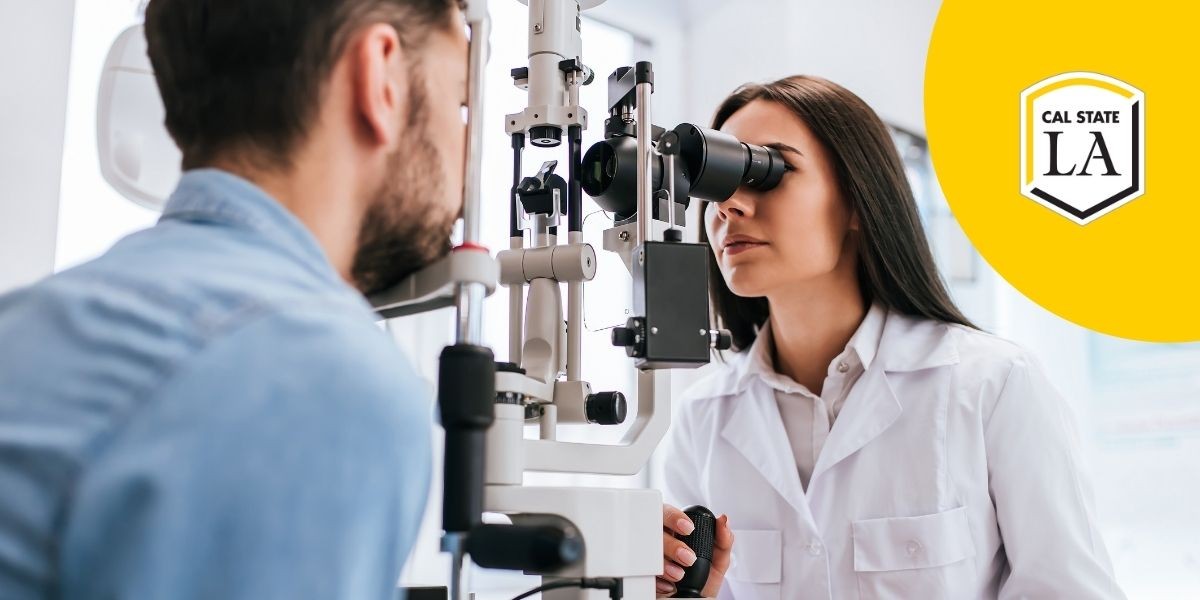“Optometrists provide full-scope primary optometric care. Their day can be quite varied and challenging. Patient interaction can include performing routine visual exams, removing a foreign body from the cornea, evaluating a child who is not performing well in school, fitting a contact lens patient, prescribing medication for glaucoma, providing follow-up care after refractive surgery, and/or fitting a patient who is legally blind with a magnifying device that enables the patient to read.”
-NAAHP Fact Sheet
“Doctors of Optometry (ODs) are the independent primary health care professionals for the eye. Optometrists examine, diagnose, treat, and manage diseases, injuries, and disorders of the visual system, the eye, and associated structures as well as identify related systemic conditions affecting the eye (American Optometric Association [AOA]). New technologies have helped the profession to expand both the scope and the efficiency of the practice. Optometrists and their patients are benefiting from the many advances in eye care and medical technology.”
–ExploreHealthCareers.org.

WHAT IS THE DIFFERENCE BETWEEN AN OPTHALMOLOGIST, AN OPTOMETRIST, AND AN OPTICIAN?
An optician is a specialist who assists in the filling of a prescription for eyeglasses. Opticians are trained to make and fit your eyeglasses and contact lenses. They usually work in retail eye glass locations and sometimes within the ophthalmologist’s offices.
An optometrist is a specialist who is a Doctor of Optometry. They are licensed to provide eye exams and to make a diagnosis of eye and vision-related conditions. An optometrist may prescribe contact lenses or eyeglasses. An optometrist, however, does not have the ability to perform any type of eye surgery. “Optometrists are often the doctors’ patients will see for routine vision care, as well as when there is an acute change in vision or status of the eyes. They are able to diagnose and treat many common eye diseases but are also critical in making the appropriate referral when a patient has a more serious problem.”
An ophthalmologist is a specialist who is medically and surgically trained to treat eye conditions. Ophthalmologists hold medical degrees, have completed residencies, and are usually fellowship trained in their field. They are certified to perform the full spectrum of eye care and vision needs, from contacts and eyeglasses to surgery.
Students seeking to make a real difference will find no better career than optometry. Only one degree qualifies you to become an optometrist: the Doctor of Optometry (OD), a four-year, doctoral-level degree. While concentrating primarily on structure, function, and disorders of the eye, students in a professional OD program will also take courses in human anatomy, biochemistry, and physiology, among others, to prepare for their role as primary-care doctors protecting patients’ overall health and wellness.
The functional guidelines in optometric education require that the candidate/student possess appropriate abilities in the following areas:
- Observation Abilities
- Communication Abilities
- Sensory and Motor Coordination Abilities
- Intellectual-Conceptual, Integrative and Quantitative Abilities
- Behavioral and Social Attributes
ADMISSION INFORMATION
OptomCAS
OptomCAS is the centralized application service for the Association of Schools and Colleges of Optometry (ASCO) and is administered by Liaison International Inc., an education information technology company located in Watertown, MA. OptomCAS allows optometry applicants to use a single web-based application and one set of materials to apply to multiple schools and colleges of optometry. Applicants who apply through OptomCAS submit a completed web-based application comprised of biographical data, colleges and universities attended, academic course history, letters of recommendation, work experience, extracurricular activities, honors and a personal essay. It is the applicant's responsibility to read and follow specific instructions for OptomCAS and the schools and colleges of optometry.
Visit the pages below for more application resources:
- Location of schools and colleges
- School-specific prerequisites
- Optometry centralized application service
- Optometric education student resources
- American Podiatric Medical Association
- American Academy of Optometry
PRE-REQUISITE COURSES
Successful completion of all General Education Requirements.
GPA Mean for admitted students: 3.4
- BIOL 1100 - Principles of Biology I
- BIOL 1200 - Principles of Biology II
- BIOL 2010 - Human Anatomy and Physiology I
- BIOL 2020 - Human Anatomy and Physiology II
- MICR 3100/BIOL 3100 - General Microbiology
- CHEM 1100 - General Chemistry I
- CHEM 1110 - General Chemistry II
- CHEM 2200 - Organic Chemistry I
- CHEM 2201 - Organic Chemistry Laboratory I
- PHYS 1100 - Physics or PHYS 2100 - General Physics I: Mechanics
- PHYS 1200 - Physics or PHYS 2200 - General Physics II: Electromagnetism and Circuits
- MATH 2040 - Applied Calculus I or MATH 2110 - Calculus I
- MATH 2740 - Introduction to Statistics or BIOL 3000 - Biostatistics
- MATH 2050 - Applied Calculus II or MATH 2120 - Calculus II
- PSY 1500 - Introductory Psychology